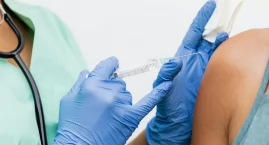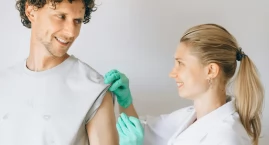A record number of reimbursed vaccinations in pharmacies. But why is it still only one specific social group that receives the vaccine?

Until recently, vaccinations in pharmacies were just a suggestion from experts. Today, they are a real and increasingly popular medical service. Over 2,000 facilities in Poland serve as vaccination centers, and pharmacists are gaining new powers. Is this the beginning of a larger revolution in the healthcare system, one that will encourage young people to get vaccinated as well? explains Mikołaj Konstanty, Ph.D., Ph.D., Member of the Presidium of the Supreme Council of the Pharmaceutical Chamber.
The introduction of vaccinations in pharmacies proved to be not only convenient but, above all, a breakthrough from an organizational perspective. Until now, patients seeking vaccination had to navigate a long and daunting path—from a visit to a primary care physician, to obtaining a prescription, to collecting the vaccine at the pharmacy, to administering it at the clinic. Today, thanks to the capabilities offered by trained pharmacists, the entire process can be completed in a single pharmacy visit.
Moreover, pharmacists authorized to administer vaccinations can also issue reimbursed vaccine prescriptions—but only in pharmacies with vaccination point status. This is a significant simplification and a nod to patients, who no longer need to make multiple visits to take care of their health.
From August 2025, the list of reimbursed vaccinations administered in pharmacies has been expanded to 15, including combined vaccines. Importantly, these vaccinations cover adults from age 18. This places Poland among the European leaders in terms of scope and level of reimbursement.
"Vaccinations against influenza, pneumococci, and COVID-19 are now available not only to seniors but also to younger patients, often at no additional cost. These changes may contribute to increased vaccination rates in groups that previously had less access to preventive care," explains Mikołaj Konstanty, Ph.D., Pharm.D., Member of the Presidium of the Supreme Pharmaceutical Chamber.
The current system allows vaccination appointments to be made up to four weeks in advance. Changes are also planned in the distribution of vaccines – including those against COVID-19 – which, starting this season, will be distributed to pharmacies via sanitary-epidemiological stations. Vaccinations are expected to begin in the second half of September, meaning the system is well prepared for the fall season.
Despite progress, experts point to significant limitations. One of these is the lack of automation in pharmacists' access to patient medical data. While age can be easily verified, comorbidities—often the basis for reimbursement—are not visible to pharmacists. The proposal calls for the creation of a secure system that allows limited access to a patient's medical history, solely for the purpose of providing a specific healthcare service.
See also:Experts are increasingly calling for the introduction of so-called population referrals. These would involve automatically informing patients – for example, via the Patient Online Account or text messages – about their vaccination eligibility. This is a simple way to increase health awareness and facilitate the implementation of preventive care throughout society.
During the COVID-19 pandemic, vaccinations in pharmacies were permitted for people over 16 years of age. Currently, the age limit is 18. Experts are calling for this limit to be lowered – at least to 12 years of age. They argue that young people are less likely to use primary care services, and it is easier for parents to arrange vaccinations at a pharmacy than at a clinic. However, legal issues, such as the requirement for a parent to be present and confirm their identity, pose a problem.
An interesting alternative could be for pharmacists to visit schools. There, after obtaining appropriate consent, they could administer vaccinations, for example, against HPV, which would significantly increase the reach of preventive care among young people.
See also:Experts point out that simply making vaccinations available isn't enough. Broad-based education is also needed. Society must understand the value of preventive care, and vaccinations should become as natural as annual dental checkups.
Prof. Adam Antczak, chairman of the Scientific Council of the National Program for Combating Infectious Diseases, points out that currently, vaccinations are mainly directed at the so-called "iron electorate" – people who are convinced to get vaccinated regardless of the circumstances.
- To achieve high vaccination rates throughout society, it is necessary to reach other groups through trusted sources of information, easy access and understandable communication.
Source: press materials Updated: 09/09/2025 06:30
politykazdrowotna








